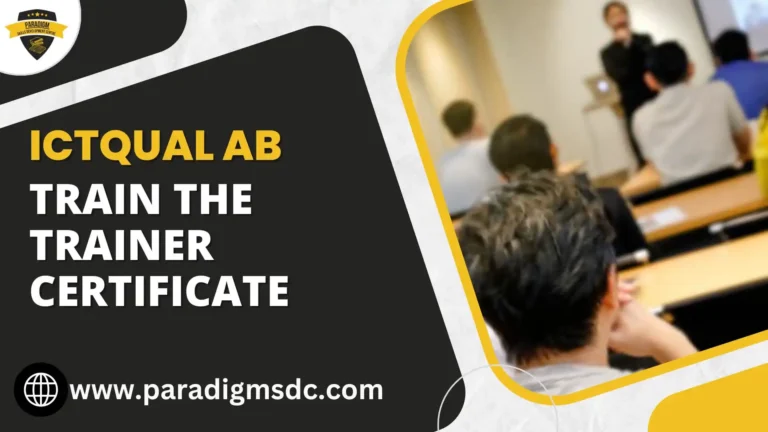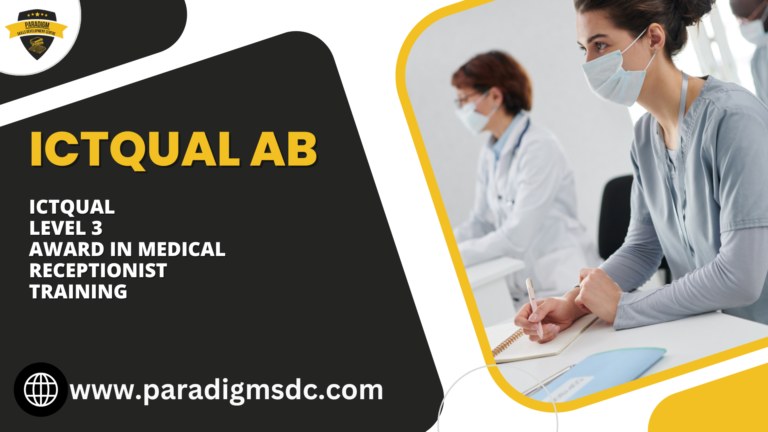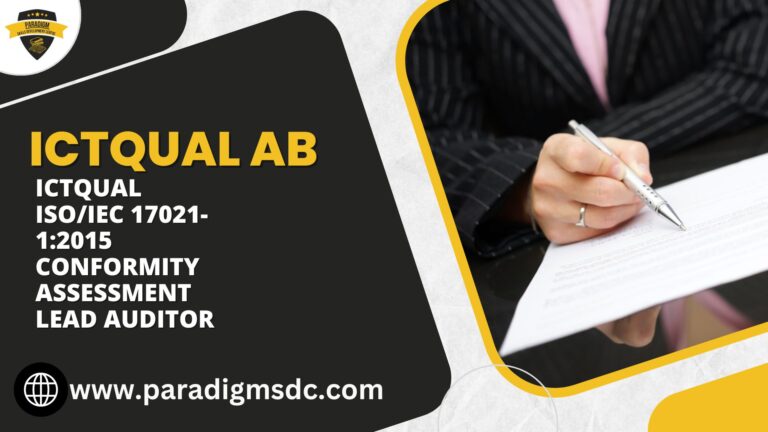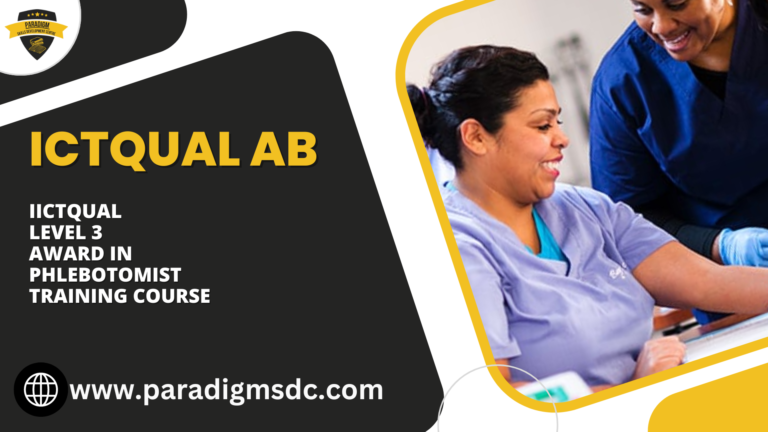Course Introduction
The ICTQual Level 3 Award in Safe Handling and Administration of Medication aims to equip learners with a comprehensive understanding of the principles and practices involved in medication management. This course covers the entire process, from prescription and storage to administration and monitoring, emphasizing the importance of accuracy, safety, and patient-centered care.
Course Overview
This course offers a thorough exploration of medication management through a combination of theoretical learning and practical application. Participants will engage in online modules, interactive workshops, and practical assessments, gaining a holistic understanding of medication handling and administration. The curriculum is designed to be engaging and informative, ensuring that learners acquire both the knowledge and the hands-on experience needed to excel in their roles.
Course Study Units
- Legislation and Guidelines
- Types and Effects of Medications
- Administration Procedures
- Safety Protocols
- Handling and Storage
- Communication and Patient Education
- Adverse Reactions and Emergency Procedures
- Infection Control and Hygiene
- Professional Ethics and Responsibilities
Learning Outcomes
Upon completing the ICTQual Level 3 Award in Safe Handling and Administration of Medication, participants will be able to:
Legislation and Guidelines
- Understand:
- Relevant legislation, regulations, and guidelines governing medication handling and administration.
- Legal responsibilities and implications related to medication management in healthcare settings.
- Apply:
- Knowledge of legal requirements to ensure compliance with medication practices.
- Procedures for documenting medication administration according to legal standards.
Types and Effects of Medications
- Identify:
- Different types of medications are based on their pharmacological effects and therapeutic uses.
- Common indications, contraindications, side effects, and interactions of medications.
- Analyze:
- The impact of medications on various physiological systems and conditions.
- Factors influencing medication effectiveness and metabolism in the body.
Administration Procedures
- Demonstrate:
- Proper techniques for administering medications via different routes (oral, topical, injections, etc.).
- Accurate dosage calculation and measurement skills.
- Perform:
- Safe handling and administration procedures according to established protocols and guidelines.
- Techniques for ensuring patient comfort and compliance during medication administration.
Safety Protocols
- Implement:
- Safety protocols to prevent medication errors, including the “Five Rights” of medication administration.
- Procedures for double-checking medications and verifying patient identity.
- Apply:
- Strategies to minimize the risk of adverse drug events and medication-related incidents.
- Documentation practices for medication administration and incident reporting.
Handling and Storage
- Apply:
- Proper techniques for storing medications to maintain their stability, potency, and safety.
- Guidelines for handling, preparing, and disposing of medications safely.
- Evaluate:
- Storage conditions and expiry dates to ensure medication integrity and effectiveness.
- Procedures for identifying and managing expired or damaged medications.
Communication and Patient Education
- Communicate:
- Effectively with patients regarding their medications, dosage instructions, and potential side effects.
- Clear and understandable information about medication administration procedures.
- Educate:
- Patients and caregivers about medication adherence, proper storage, and disposal practices.
- Strategies for addressing patient concerns and questions regarding medications.
Adverse Reactions and Emergency Procedures
- Recognize:
- Signs and symptoms of adverse drug reactions and medication emergencies.
- Immediate actions to taken in case of adverse events or medication errors.
- Apply:
- Emergency procedures to manage adverse reactions effectively and promptly.
- Communication protocols to notify healthcare team members and document incidents.
Infection Control and Hygiene
- Understand:
- The importance of infection control practices during medication handling and administration.
- Techniques for maintaining hygiene standards to prevent contamination and the spread of infections.
- Implement:
- Procedures for hand hygiene, personal protective equipment (PPE) use, and environmental cleanliness.
- Measures to minimize the risk of healthcare-associated infections related to medication practices.
Professional Ethics and Responsibilities
- Adhere:
- To ethical principles in medication administration, including confidentiality and patient autonomy.
- Professional codes of conduct and legal obligations related to medication management.
- Demonstrate:
- Respect for patient rights, dignity, and cultural beliefs in medication-related interactions.
- Accountability and responsibility in maintaining patient safety and well-being.
Course Benefits
- Enhanced Knowledge: Gain a comprehensive understanding of safe medication management.
- Practical Skills: Develop essential skills through hands-on practice and real-world scenarios.
- Career Advancement: Improve career prospects in healthcare settings.
- Patient Safety: Contribute to improved patient safety and treatment outcomes.
- Professional Confidence: Build confidence in handling and administering medications accurately and safely.
Who Is This Course For?
The ICTQual Level 3 Award in Safe Handling and Administration of Medication is ideal for:
- Nurses and healthcare assistants involved in medication administration.
- Pharmacy technicians and pharmacists seeking to enhance their medication management skills.
- Caregivers and support workers responsible for administering medications.
- Healthcare professionals working in hospitals, nursing homes, clinics, and home care settings.
- Students and trainees in healthcare-related fields looking to gain a foundational understanding of medication management.
Future Progression
Upon completing the ICTQual Level 3 Award in Safe Handling and Administration of Medication, participants can further their education and career development through:
- Advanced Medication Management Courses: Pursue higher-level qualifications and specialized training in medication management, pharmacology, or clinical pharmacy.
- Professional Certifications: Obtain certifications in specific areas of medication administration, such as intravenous therapy or chemotherapy administration.
- Higher Education: Enroll in undergraduate or postgraduate programs in nursing, pharmacy, or healthcare management.
- Specialized Training: Participate in training programs focusing on specialized medication management areas, such as pediatric or geriatric pharmacology.
- Leadership Roles: Progress to supervisory or managerial positions within healthcare organizations, overseeing medication management practices.
The ICTQual Level 3 Award in Safe Handling and Administration of Medication is an essential step for healthcare professionals committed to delivering safe, effective, and patient-centered care. Equip yourself with the skills and knowledge to ensure precision and care in medication management, and elevate your career in the healthcare field.







